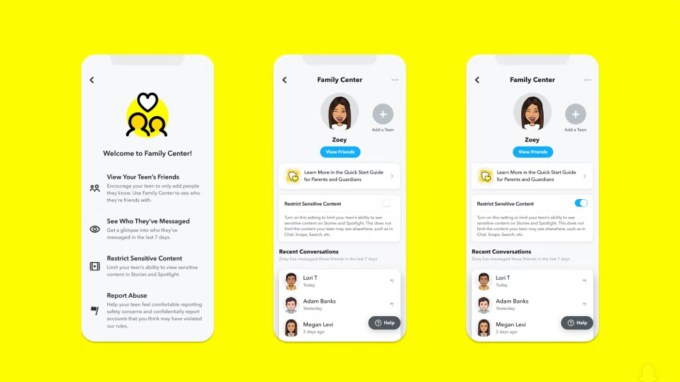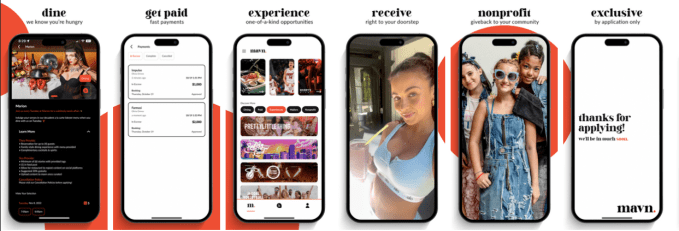This Week in Apps: AI-powered productivity apps, US weighs TikTok ban, SVB crash boosts crypto apps
Welcome back to This Week in Apps, the weekly TechCrunch series that recaps the latest in mobile OS news, mobile applications and the overall app economy.
The app economy in 2023 hit a few snags as consumer spending last year dropped for the first time by 2% to $167 billion, according to data.ai’s “State of Mobile” report. However, downloads are continuing to grow, up 11% year over year in 2022 to reach 255 billion. Consumers are also spending more time in mobile apps than ever before. On Android devices alone, hours spent in 2022 grew 9%, reaching 4.1 trillion.
This Week in Apps offers a way to keep up with this fast-moving industry in one place with the latest from the world of apps, including news, updates, startup fundings, mergers and acquisitions, and much more.
Do you want This Week in Apps in your inbox every Saturday? Sign up here.
Top Stories
Our Everyday Apps Get AI
While the announcement wasn’t necessarily targeted toward mobile, the sweeping AI-fueled changes that are coming to the biggest productivity apps from Microsoft and Google will have a wider impact on the productivity app industry. That is, they’re now raising the stakes for what a productivity app should be able to do. It will no longer be enough to simply offer an elegant, refined, and efficient note-taking tool, docs editor, spreadsheet, slideshow maker, and so on — the apps will also need to have baked-in AI smarts.
This week, in case you missed it, both Microsoft and Google announced the new generation of their productivity software products. Microsoft, which calls its digital helper a “Copilot,” is bringing AI to everyday tools like Word, Excel, Outlook, PowerPoint, Teams, and more. It’s integrating a new Business Chat feature that understands what a knowledge worker has in their inbox, calendar, chats, and across their files, and can be prompted to do things like create a status report on a project that’s then shared to the team. It’s even leveraging AI to help workers build their own line-of-business apps using natural language prompts.
Elsewhere, Microsoft-owned LinkedIn expanded its generative AI assistant to recruitment ads and writing profiles. The company’s AI-powered writing suggestions are built on advanced GPT models, including GPT-4 (profiles) and GPT-3.5 (job descriptions).
Google, meanwhile, said it would bring AI tools to Workspace, its productivity suite that includes Gmail, Docs, Sheets, Meet, Slides, and Chat. Though the company hasn’t fully shared its vision for Chat — saying only that it will “enable workflows for getting things done” — it’s likely aiming to keep up with Microsoft’s plans. In addition, Google is leveraging generative AI to create auto-generated images, audio, and video in Slides, which is an interesting angle on modern productivity — and, potentially, a threat to the one-off tools built to address each individual generative AI use case.
These enhancements to users’ everyday apps, from emails to docs to spreadsheets and more, will help to bring AI to mainstream users in a way that a ChatGPT-powered Bing alone cannot. The new tech is now just baked in, under the hood, offering additional functionality to the end user. It may eventually even reduce the working hours required to complete various tasks, as productivity users lean more on AI to write and edit for them, create presentations, take meeting notes, manage inboxes, and more.
But to what end? Will workers now be expected to fill their newly freed hours with ever more work or will technology finally fulfill its original promise of allowing us to lead more comfortable lives? Do we still need to work 40 hours a week when AI can work for us?
TikTok’s fate up in the air in U.S.
Will they or won’t they…ban TikTok? That’s the question sure to be on the minds of ByteDance execs as they weigh their decision to either spin off the U.S. operations of the TikTok app or risk being fully banned in the U.S. The anti-TikTok sentiment in Congress has rare bipartisan support at a time when the two sides can’t seem to agree on anything, which makes the potential for a ban look more likely. It’s not helping ByteDance’s case that the FBI and DOJ are investigating ByteDance’s use of TikTok to spy on journalists, either.
Other Western markets are also taking steps to limit TikTok’s threat, not just the U.S. This week, New Zealand banned TikTok from government devices days after the U.K. did the same. The moves follow lawmakers’ banning of the app in Canada and Belgium and in the E.U.
TikTok, for the time being, is hoping to assure lawmakers of its safety, even offering an audit by U.S. tech giant Oracle.
But while a full ban may put an end to lawmakers’ immediate concerns about the potential for CCP surveillance of U.S. citizens or the potential to manipulate the populace with pro-China propaganda, the real concern here is lawmakers’ inability to pass regulations over U.S. user data privacy for all our apps, not just those from China.
Expect next week’s Congressional hearing with TikTok CEO Shou Zi Chew to be an interesting one to watch!
SVB meltdown hits app makers, boosts crypto apps
Silicon Valley Bank’s failure was the biggest story of this week, as numerous tech companies, large and small, and their investors had funds tied up in the bank, which is now under regulator control and whose parent company is officially filing for bankruptcy. Among the public companies with exposure to SVB were big names like Roku, Roblox, Quotient, Vimeo, Rocket Lab, SoFi, Life360, Sezzle, Unity, AppLovin, Wish, and many others.
While there were several factors that played into the eventual bank run, from bad bets to bad decisions, the ability to stoke fear and panic on Twitter played a notable role, with some investors tweeting in ALL CAPS that people should be ABSOLUTELY TERRIFIED RIGHT NOW.
U.S. lawmakers have since taken notice of how bad actors on Twitter factored into the bank’s collapse, even going so far as to blame VCs and others for using social media apps and online chats to coordinate their SVB withdrawals, effectively ensuring the bank’s failure.
“I’ve been supportive of the venture capital community — I was a venture capitalist before — but I think there were some bad actors in the VC community who literally started to spur this run by virtually crying fire in a crowded theater in terms of rushing all these deposits out,” said Sen. Mark Warner (D-Va.) in a report by The Hill.
“No matter how strong capital and liquidity supervision are, if a bank has an overwhelming run that’s spurred by social media or whatever so that it’s seeing deposits flee at that pace, the bank can be put in danger of failing,” Treasury secretary Janet Yellen also said.
Whether the bank’s failure — and the subsequent failures of crypto-friendly banks Signature and Silvergate — will lead to new, retightened regulations remains to be seen, but one category of apps did benefit from the chaos.
Despite the seeming contagion to crypto banks, Apptopia reported the top crypto apps’ downloads rose over 15% following SVB’s collapse. At the same time, the top 10 traditional banks and top 10 “digital first” bank app downloads fell by about 5% and 3%, respectively. This begs the question of whether the people shouting FIRE! last weekend were also those who were heavily invested in crypto and therefore would have benefited from negative public sentiment toward traditional banking.
Though the fed is making SVB’s depositors whole, the crisis also exposed the reach of SVB’s tendrils beyond the Valley and the potential for a banking collapse to disproportionately impact some groups over others. The effects were felt as wide as the African startup ecosystem and highlighted the inequities in the broader tech industry. On one side, you have startups whose founders could self-fund their companies while waiting on a resolution, and on the other, there were serious concerns over missing payroll and business stoppage.
Many suspect we’ll see continuing fallout from SVB in terms of raising venture debt, something SVB was known for. Whether it opens up the floor to new entrants or drives up the cost of venture debt is being debated, but we’re sure to feel the impacts of this failure for months to come.
Platforms
Apple
- Apple rolled out its fourth developer betas for iOS 16.4, iPadOS 16.4, watchOS 9.4, and tvOS 16.4.
- Apple launched a new way to shop for iPhones with help from a live specialist. The sales rep cannot see you but you can see them while asking questions about models, features, offers, trade-ins and more.
- Apple is reportedly moving forward with its AR/VR headset this year.
- Apple AI experiments? According to a new report from The New York Times, many teams at Apple, including those working Siri, have been testing “language-generating concepts.” A former Apple engineer told the paper Siri’s development had been slow because of clunky code, which made it harder to update. It’s not known if Apple is now building its own LLMs or adopting an existing model.
Android
- Google said its Google Play Games for PC service, which brings Android games to Windows users, will roll out to Japan and to European markets and will gain new titles and tools for game developers. Over the next couple of months, the service will add several popular games, including Garena Free Fire, Ludo King (a popular board game in India), and MapleStory M. It will also introduce early access to machine translation in the Play Console for translating games into 8 languages.
- Missed the Google for Games Developer Summit? Google has a recap here.
App News
Social Apps

Image Credits: Snapchat
- Snapchat added new parental controls that block “sensitive” and “suggestive” content from viewing by younger teens. The company said it’s introducing content filtering capabilities that will allow parents to restrict teens from being exposed to content that’s not prohibited but shouldn’t be recommended to younger users across Stories (Discover) and Spotlight. The feature still requires parents to access these parental controls in the Family Center, which they may not know exists.
- Pinterest is partnering with America’s largest publisher Dotdash Meredith on exclusive video content from brands such as Better Homes & Gardens, Southern Living, Brides, Food & Wine, Serious Eats, Allrecipes and Martha Stewart. Pinterest recently announced a similar deal with Condé Nast.
- Meta is focusing on its “year of efficiency” by cutting another 10,000 jobs.
- Meta also gave up on NFTs, shutting down the NFT and digital collectible features on Instagram and Facebook.
- Instagram tests a feature that makes it easier to reshare Reels you sent to friends.
- Meta launched paid verification on Instagram and Facebook in the U.S. Meta Verified is $11.99 per month on the web or $14.99 per month on mobile. The feature delivers a verified badge, proactive impersonation protection and direct access to customer support.
- Twitter starts showing how many times a tweet has been bookmarked, initially on iOS. The company promises it won’t display who is bookmarking tweets, though. It’s not clear whether anyone cares how many bookmarks a tweet has, but the goal is likely aimed at making Twitter look more engaging.
- Twitter’s API packages are getting pricey. The company’s new Enterprise Packages start at $42,000/mo for 50 million tweets.
Entertainment & Streaming

Image Credits: TikTok
- YouTube said Trump can come back. (Which means he probably bought ads.)
- TikTok entered a multiyear partnership with Major League Soccer. Fans will be able to search “MLS” on TikTok and get access to a new “MLS Hub,” featuring new content from MLS clubs and players.
- TikTok also added a new “Refresh” button that lets users reset their feed recommendations with fresh content when their FYP gets stale (SEE ABOVE). When the Refresh button is tapped, TikTok will surface content as if you had just signed up for the app.
- And TikTok is adding a new STEM content feed alongside its FYP and Following feeds to U.S. users.
- Twitch CEO Emmett Shear is stepping down. One of the original founders of Justin.tv, Shear has worked at Twitch for 16 years and is ready to move on. Twitch president Dan Clancy will take the CEO role effective immediately.
- U.S. employees at Epic Games–owned Bandcamp, an online audio distributor, announced their formation of a union.
- YouTube TV is hiking prices to $72.99 per month due to rising content costs. Making up for the increase a bit, the service also announced it’s beginning to roll out multiview, which allows U.S. users to watch up to four streams simultaneously, initially for sports content.
- SiriusXM is planning to reboot itself as an app more focused on streaming. The company isn’t dropping satellite radio just yet, but moving toward a future where the delivery method won’t be as relevant.
- Sling TV launched new features for sports fans, including picture-in-picture mode and an iOS widget. The features include a new “Side View” that lets web users watch games in a small screen overlay on top of whatever it is they’re doing. There’s also a new custom widget for iOS devices and an updated live “Sports Scores” feature.
- Spotify said HiFi will still come out “at some point.” We’ll believe it when we see it.
- FilmRise launched FilmRise For Her, which streams rom-coms, movies with lead actresses, true crime, and more.
- Kakao Entertainment will shut down the Korean branch of Tapas Entertainment, its U.S.-headquartered storytelling platform, next month.
- TuneIn, the radio service that allows users to livestream news, sports, music and podcasts, rolled out an interactive map feature, TuneIn Explorer, to iOS and Android devices. The app now gives users the ability to listen to stations around the world.
Gaming
- The FTC finalizes Epic’s $245 million settlement over sketchy Fortnite purchases. “Fortnite’s counterintuitive, inconsistent, and confusing button configuration led players to incur unwanted charges based on the press of a single button,” the FTC wrote. It also criticized Epic for allowing kids to make unauthorized purchases without their parents’ permission.
- Unreal Editor for Fortnite (UEFN) is set to launch on March 22, according to a tweet from an official Fortnite account.
AI
- Be My Eyes, an app that allows blind and low-vision people to ask sighted people to describe what their phone sees, is gaining AI capabilities powered by GPT-4. The app’s new “Virtual Volunteer” will be able to answer questions about images users snap and provide instantaneous visual assistance for a wide variety of tasks.
- Language learning app Duolingo debuted a Max subscription for $30/month or $168/year that offers GPT-4 features for English speakers taking Spanish and French courses. The AI feature is rolling out to iOS first.
Etc.
Security Concerns
- Twitter’s dumb decision to make SMS 2FA a paid feature will kick in this weekend. Here’s how to protect yourself.
- Google warns users to take action to protect against remotely exploitable flaws in popular Android phones. Google’s security research unit sounded the alarm about a set of vulnerabilities found in certain Samsung chips included in dozens of Android models, wearables and vehicles.
- Firefox launched Total Cookie Protection, which stops cookies from tracking you around the web, to its Firefox Android app.
Funding and M&A

Image Credits: Sidechat & Yik Yak logos, image via TechCrunch
- Anonymous app Sidechat picks up rival Yik Yak…and users aren’t happy. A quiet acquisition involving two press-shy companies was unveiled by a publisher name change on the App Store and users complained about being forced to move to Sidechat.
- NYC-based transportation startup Via will acquire London-based Citymapper, a Google Maps alternative for planning journeys in a city using public transportation. Citymapper has around 50 million global users. Financial terms are not being disclosed but are a mix of cash and stock. Sources said the deal is mostly a washout for investors.
- Walmart invested $200 million in Indian mobile payments giant PhonePe.
- Meal delivery startup Entrée raised $2.5 million in pre-seed funding led by M25 with participation from investors, including Hustle Fund, Pillar VC and The Community Fund. The app offers fine dining meals delivered to the home with an average order volume of over $60.
- Bloomberg reports that Abu Dhabi–based G42 has acquired a $100 million+ stake in ByteDance at a ~$220 billion valuation. This valuation is down from the $300 billion valuation ByteDance set during a recent share buyback program.
- Ho Chi Minh City–based prescription delivery app Medigo raised $2 million in new funding from East Ventures, with participation from Pavilion Capital and Touchstone Partners.
Government, Policy and Lawsuits
Downloads
Camo 2
A popular webcam app for PC and Mac is returning. Camo was originally launched in 2020 to allow iPhone users to use their phones as a webcam. Now, Camo 2 is out, offering support for any webcam, including regular webcams as well as built-in devices, monitors with built-in cameras, DSLR and mirrorless cameras, inputs from capture cards and HDMI dongles, action cameras and other software virtual cameras.
Mavn

Image Credits: Mavn
Reports Lauren Forristal: Mavn is “a new female-founded startup that connects content creators with brands and other businesses.” The new app gives users “access to a variety of experiences, from PR packages and paid posts to campaigns, photoshoots, events, dining at fancy restaurants and more.” The app is available for both iOS and Android.
Petey: AI assistant brings ChatGPT to the Apple Watch

Image Credits: Petey
The app was previously called watchGPT, but Apple’s crackdown on GPT apps led the developer to have issues getting the app approved. So the name was changed, and boom, the app went live. As the name implies, Petey offers a ChatGPT-like experience from your Watch, allowing users to ask questions either with or without typing and have the answers read out to you via text-to-speech. The app also includes a complication so you can quickly open the assistant with a tap on your watch face.
Ghost

Image Credits: Ghost
A new startup called Ghost believes that putting in extra guardrails around the anonymous experience will allow users to have fun, without the usual downsides. To test this theory, the company has launched its Ghost messaging app that allows users to share an anonymous message in a group chat with friends in order to flirt, joke, or ask questions without revealing their identity. The app also includes a range of other features, including the ability to ask ChatGPT a question directly within the group chat, among other things.


